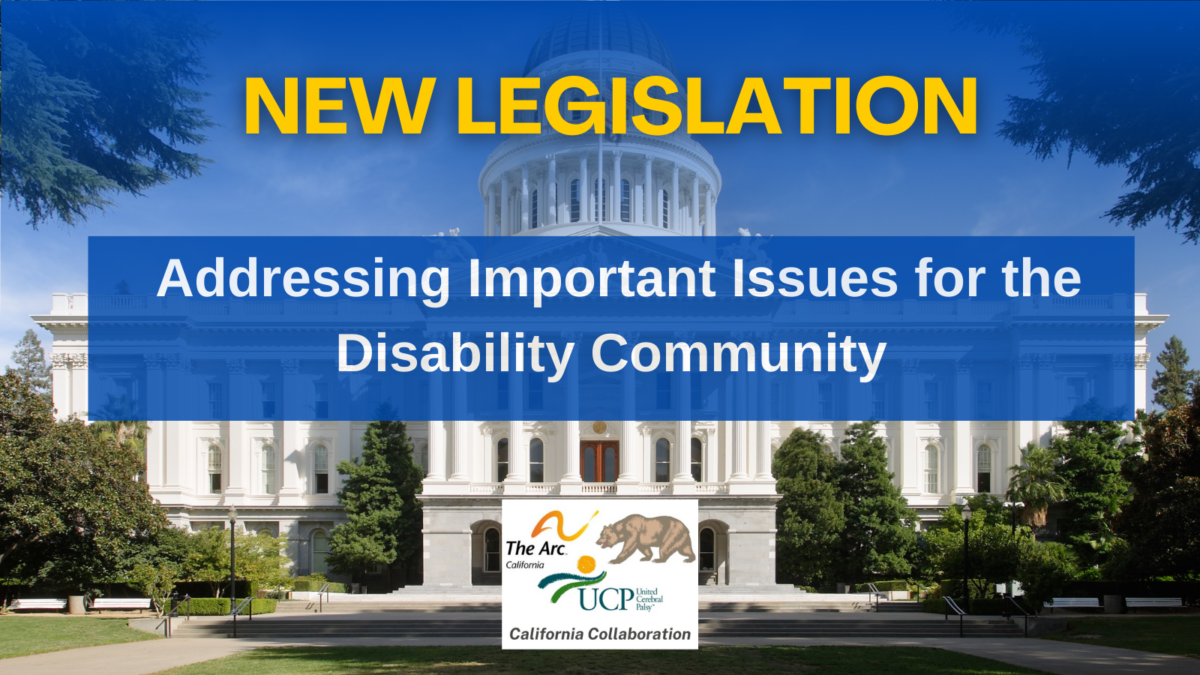By Jim Frazier, Public Policy Director, The Arc / UCP California Collaboration
Over the last several months The Arc & UCP California Collaboration has been actively meeting with individuals with disabilities, their parents, and other advocates to find solutions to some of the most daunting issues facing our community. Some of the issues impact every person with a disability in California, and some only a small group, but all of them are critically important. Out of those discussions came five solutions that could be best solved through legislation. We were fortunate that several members of the legislature champion the disability community this year and we are honored to partner with them on the following bills:
AB 1906 (Gipson), Changing terminology and description: Current law prohibits, and prescribes heightened penalties for, the commission of specified offenses of abuse committed against an elder or dependent person or dependent adult. Existing law also mandates reporting of known or suspected cases of elder and dependent adult abuse. Current law defines the terms “dependent person” and “dependent adult” for purposes of these provisions. This bill would change those terms in selected statutes to “person with a disability” and “adult with a disability” and would state the intent of the Legislature that those terms be changed in the remaining code sections provisions of law that use them as changes are made to the code those statutes are amended in the future.
AB 1914 (Grayson), Certification program for Direct Support Professionals: Would express findings and declarations of the Legislature relating to the need in the state for well-trained providers of care for individuals with developmental disabilities. The bill would require the Chancellor of the California Community Colleges office to develop a model curriculum for a certification program for providers of care for individuals with developmental disabilities, designed to be offered at community college campuses where there is sufficient student interest and a properly qualified faculty to sustain a certification program. The bill would require the chancellor’s office, in developing the model curriculum, to consult with individuals and organizations with expertise in providing care to individuals with developmental disabilities and the training of practitioners for that task.
AB 2397 (Maienschein) Child support to trusts: Current law continues the parental duty to support an unmarried child who has attained 18 years of age, is a full-time high school student, and who is not self-supporting, until the time the child completes grade 12 or attains 19 years of age, whichever occurs first. Current law provides that both parents have an equal responsibility to support their child in the manner suitable to the child’s circumstances. Current law authorizes the establishment of a special needs trust if a court makes specific determinations, including that the minor or person with a disability has a disability that substantially impairs the individual’s ability to provide for their own care. This bill would authorize a court to order that a support payment be paid to a special needs trust, as specified.
AB 2510 (Arambula) Dental care for people with developmental disabilities: he Lanterman Developmental Disabilities Services Act requires the State Department of Developmental Services to contract with regional centers to provide services and supports to individuals with developmental disabilities and their families. This bill would require the State Department of Developmental Services to contract with California Northstate University (CNU), no later than _____, to establish a statewide program centered in the state’s regional centers, to improve the provision of dental care services to people with developmental and intellectual disabilities, and specifically to prevent or reduce the need for developmental services consumers to receive dental treatment using sedation and general anesthesia. The bill would require the program to establish an Oral Health for People with Disabilities Technical Assistance Center, headquartered at CNU. The bill would require the center, among other responsibilities, to provide practical experience, systems development, and expertise in relevant subject areas, to train, monitor, and provide support for regional center and oral health personnel, and to collect and analyze program data with the support of participating regional centers and oral health providers. The bill would require the department to submit an annual report of the collected data to the Legislature. The bill also would specify regional center duties, including identifying consumers who can benefit from the program, and establishing vendor agreements with interested oral health professionals. Duties of the department would include providing guidance and establishing protocols to support the program, and establish procedures for regional center directors for participation in the program and allowing aggregation and publication by the center of deidentified results data, as specified.
AB 2360 (Rendon), Developmental services, Family Wellness Program: The Lanterman Developmental Disabilities Services Act requires the State Department of Developmental Services to contract with regional centers to provide services and supports to individuals with developmental disabilities and their families. This bill would require the department to establish a Family Wellness Pilot Program under which regional centers shall provide counseling and peer support group services to the families of regional center consumers, as specified. The bill would require the department to evaluate the program and submit a report on the evaluation to the Legislature on or before July 1, 2029.
Please consider sending letters of support to the legislative bill sponsors to help us move this important legislation to the Governors desk for his signature.
- To find contact information for an Assembly Member click HERE.
- To find contact information for a Senator click HERE.
Thank you for being an outstanding advocate!

